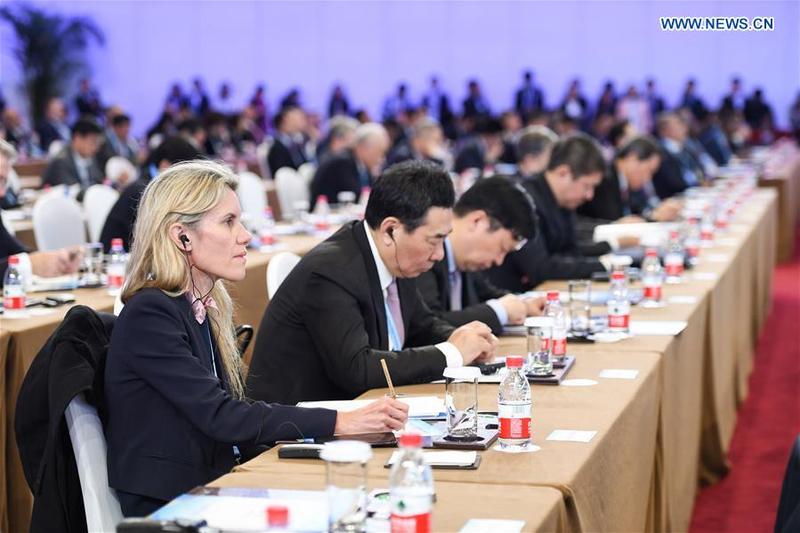



As the number of countries participating in the Belt and Road Initiative (BRI) continues to climb, private firms around the world do not want to miss out on the opportunities.

Participants take part in the Belt and Road CEO Conference at the China National Convention Center in Beijing, capital of China, April 25, 2019. [Photo/Xinhua]
At the ongoing Second Belt and Road Forum for International Cooperation (BRF), scheduled from Thursday to Saturday in Beijing, global business leaders regard the forum as a golden opportunity to secure new deals or partnerships.
Unlike the first BRF two years ago, this year's forum, featuring a CEO conference and a B2B matching session that are designed specifically for the business world, has attracted enterprises from 88 countries and regions.
Arancha Gonzalez, executive director of the International Trade Center, described the special session for enterprises a "very welcomed innovation."
"Private sector participation, both Chinese and foreign, will be essential to ensure the long-term sustainability, vitality and efficiency of the Belt and Road Initiative," said Gonzalez.
More than five years after its launch, cooperation under the BRI has become increasingly pragmatic, with a series of down-to-earth projects initiated by private companies, showing the appeal of the BRI.
Le Xuan Nghia, a Vietnamese contractor, came to the forum to sign a deal worth some 1.15 billion yuan (about US$170 million) on three pig breeding projects with the Chinese agricultural conglomerate New Hope Group.
"Chinese companies have competitive advantages in terms of financing, technology and infrastructure construction, while Vietnam has a very promising agricultural market," said Nghia, adding that the BRF has given him a global platform to connect with other companies in the industry.
The three pig farms are expected to provide Vietnam with nearly 1 million pigs annually, offering a safe food supply to the country while creating jobs for the locals, said Zhang Xiangjun, general manager of the New Hope Binh Phuoc Livestock Company.
Zhang Xin, chairman of TBEA, an energy equipment supplier that has a presence in many Belt and Road countries including Tajikistan and Pakistan, said that the BRI has offered a platform for firms of all kinds to learn from others and brainstorm new ideas.
"The BRI has encouraged many private companies in China to go onto the world stage," Zhang said.
According to data from the All-China Federation of Industry and Commerce, out of the top 500 private firms in China in 2017, 274 have participated in BRI projects.
To ensure long-term sustainability, the BRI should be more inclusive and support B2B exchanges among more small- and medium-sized enterprises (SMEs), said Gonzalez.
"The Belt and Road Initiative cannot be only for the 1% of big enterprises, but we also must work to make the initiative for the 99% of our economies – the small and medium enterprises that are the backbones of the economies along the Belt and Road," she said.
Davide Cucino, chairman of the China-Italy Chamber of Commerce, said that compared with larger firms, SMEs have fewer instruments to participate in international projects, and that is where government-initiated platforms and events such as the BRF come in to help.
"Companies also need to let the government know about their needs. It must be a two-way communication," Cucino said.
As the first Group of Seven nation to participate in the BRI, Italy is both giving and receiving opportunities, Cucino said.
"Sooner or later all countries will embrace the initiative," he said.
